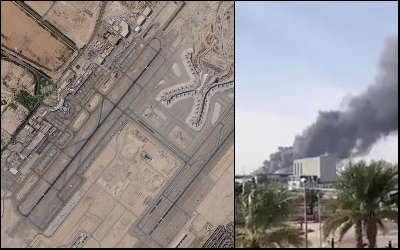For many years, one of the more prominent fault lines in the Middle East was perceived as being between the Jewish State and the Arab world. There was an almost facile Western understanding that all of the centuries-old conflicts in the region could be seen through the prism of the 100-year conflict between Jews and Arabs in the Land of Israel.
Thankfully, this tired idea of ‘linkage’ has long been debunked by the realities on the ground.
However, there is a very real fault line in the Middle East that has become even more stark in recent weeks.
The situation in Lebanon where Iran’s proxy Hezbollah is holding a nation hostage to its whims and narrow political and ideological aims is creating new understanding and alliances there. This, coupled with the recent attacks on the UAE by the Iran-backed Houthis from Yemen, are demonstrating that the Middle East is now divided by the moderates who want a more stable and peaceful future for the region, and those who seek to sew chaos, conflict and bloodshed.
| The Middle East is now divided between moderates and those who seek to sew chaos and bloodshed. |
The peace and normalization agreements between Israel and the UAE, Bahrain, Morocco and Sudan, as well as warming ties around the Sunni world, have demonstrated a historic understanding of the reality that the Israel-Arab conflict is dead.
The result has seen economic, security and cultural agreements between the Jewish State and its neighbors.
Nevertheless, I believe the time is ripe to go even further.
If the Houthi attacks on the UAE have been paradigm-shifting, then the reactions to them also tell us about the forming sides in this new-old conflict.
 The January 17 missile/drone attack on Abu Dhabi by Houthi rebels was a major escalation. The January 17 missile/drone attack on Abu Dhabi by Houthi rebels was a major escalation. |
In the Palestinian arena it seems like there is great sympathy and support for the murderous attacks by the Houthis against their Sunni brethren.
In Gaza, there were mass celebrations after the Houthis launched missiles which hit a fuel depot in Abu Dhabi, killing three people, and causing a fire near its international airport.
Gazans took to the streets chanting “Death to the House of Saud,” and waved posters of the leader of Yemen’s Houthi militia. Meanwhile, the hashtag, “#Palestinians Support the Houthis,” was trending on social media.
Mahmoud Zahar, a top Hamas official, said that he supports Houthi attacks against the United Arab Emirates.
When the UAE retaliated for the attacks, Hamas, Palestinian Islamic Jihad (PIJ) and the Popular Front for the Liberation of Palestine (PFLP) condemned the strikes on the Houthis.
Fatah, the party of Palestinian leader Mahmoud Abbas was equivocal. In an official statement, the party said that the position of the Palestinian Arab leadership has always been not to interfere in the internal affairs of Arab states.
Hardly, a rousing support for those who have supported their cause for decades.
With this in mind, it is time for Israeli officials to call for a closer strategic position with their new Arab friends and allies.
The Jewish State can and already is helping the pragmatic Arab states fight their wars against Iran and its proxies, but it is now time for a clear quid pro quo.
Israel is fighting an ongoing conflict against Palestinian Arab terrorist groups who seek its destruction, militarily, economically and diplomatically.
It should now be abundantly clear whose side these groups are on. They support and seek Iran’s ascendancy in the region, which affects Israel and Sunni nations alike.
As a tweet from a Saudi made clear, the Palestinian Arabs sided with Saddam Hussein, Hezbollah and now the Houthis. If we were fighting against the devil, they would stand by his side, the Saudi tweeted.
It should now be clear that Israel’s battles are Saudi Arabia’s battles, and vice versa.
This should lead to clear and concerted thinking by the leaders of the region that the time has come for a paradigm-shift.
| It is time for Arab leaders to actively help Israel defeat Palestinian violent rejectionism. |
It is time for Arab leaders, maybe below the radar at first, to actively help Israel combat and defeat Palestinian violent rejectionism. They should take steps to stop the flow of funds to the Palestinian Arab leadership that refuses to stand by their side, and take no further role in the ongoing delegitimization and legal and diplomatic attacks against Israel in international forums.
They should give Israel their backing to achieve victory against its enemies.
Even a symbolic military assistance could be enough to force the Palestinians to understand that the Arab world which they rely on is no longer by their side. Nor are they sitting on the fence, but taking the side of Israel to end the conflict once and for all.
Defeating Hamas, Islamic Jihad and the other terrorist groups who side with Iran and its proxies would not just be a win for Israel, but a victory for the whole region.
It would be a signal to the Islamic Republic’s leadership that it can no longer attack its neighbors with immunity and impunity. It would be the beginning of the defeat for the Shiite extremist, hegemonic and colonialist venture.
Thus, an Israel victory would be a victory for all the peoples of the region.
{Reposted from the MEF website}






![Why You Shouldn’t Be Afraid of G-d – Soul Talk [audio]](https://c622d1ec.delivery.rocketcdn.me/wp-content/uploads/2025/03/light-4681014_640-218x150.jpg)
![Modesty & Matzah – Pull Up a Chair [audio]](https://c622d1ec.delivery.rocketcdn.me/wp-content/uploads/2025/03/matzah-1566456_640-218x150.jpg)
















